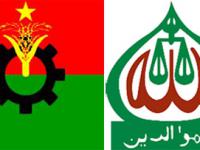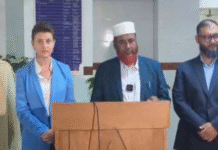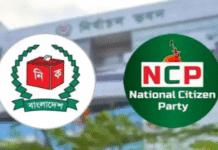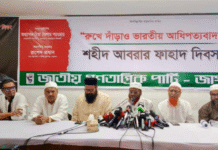BNP’s political ally Jamaat-e-Islami has been worried after talks between Indian prime minister Narendra Modi and BNP chairperson Khaleda Zia.
According to sources in both parties, Jamaat leadership became particularly concerned after various media reported that during the meeting, Khaleda Zia indicated that her party was cutting ties with Jamaat. They have contacted BNP leaders to find out what actually transpired at the meeting.
There has also been mixed reaction within Jamaat concerning the party’s statement issued on 7 June, no sooner than Narendra Modi has left, expressing disappointment at the visit. Many in the party feel that such a hurried statement should not have been issued. Several senior leaders of Jamaat have decided to refrain from making any adverse comments about India for the time being.
The leaders say that they have been assured that the issue of Jamaat did not arise during the half an hour of talks between Narendra Modi and the BNP delegation. However, Jamaat has learnt that Modi and Khaleda agreed not to disclose the details of their 12 minute exclusive meeting.
Jamaat’s central executive committee member Hamidur Rahman Azad said, “We are not aware if either Narendra Modi or Khaleda Zia has disclosed what that they discussed during their exclusive talks.”
Another source of Jamaat says that very shortly there will be indications of BNP’s attitude towards them. This month there is a certain occasion for that.
These circumstances have put BNP-Jamaat relations at risk. BNP’s present spokesperson Asaduzzaman Ripon told Prothom Alo, “It is not true that BNP’s relations with Jamaat are at risk after Modi’s visit. However, it was from beforehand that there has been unease or differences with Jamaat from within the BNP. The BNP leaders and activists have been dissatisfied with Jamaat’s role during the last street agitation.”
One of the other five members of the BNP delegation that met Narendra Modi told this correspondent that during the 30-minute meeting Khaleda Zia thanked Modi for the Land Boundary Agreement. She spoke of the people’s disappointment that the Teesta deal was not signed. She expressed her hope that it would be signed shortly under Modi’s leadership. The BNP leader also praised Modi’s sincere endeavours towards the development of SAARC countries, inter-connectivity and mutual relations. Three leaders of BNP spoke of the need for political stability and democratic practice in the interests of development. They spoke of the 5 January one-sided election that brought the present government to power and of the government oppression and repression.
Two members of the delegation said that Modi stressed three issues. These were the importance of democracy; relations between the people of the two nations, not two parties; and the need to be alert against terrorism. The BNP leaders also highlighted the party’s stand against terrorism and militancy.
One of the BNP delegation members told Prothom Alo, they were prepared for the issues of the party senior vice chairman Tarique Rahman and Jamaat to arise during talks with Modi, but these issues did not arise during the half-hour meeting. Modi’s focus was on South Asian regional relations.
During his public speech at Dhaka University on the last day of his visit, Modi spoke of Bangladesh and India’s shared stand against terrorism and militancy. He praised prime minister Sheikh Hasina for her zero tolerance towards militancy. Following this speech, the media both in Bangladesh and India have been referring to BNP-Jamaat’s violent movement.
As to whether Modi’s statement was a reference to Jamaat, BNP’s standing committee member Nazrul Islam Khan said, terrorism indicates the banned organisations and those who are extremists. The government would have banned Jamaat if it was a militant organisation. Terrorism and militancy are not new topics, these are international issues.
Prior to Modi’s Bangladesh visit, the media of both countries mulled about India’s unease with Tarique Rahman.
An influential BNP leader dealing with international affairs and communications said, an official of an important agency of India over the past few months, prior to Modi’s visit, has met thrice with a BNP leader. Jamaat and Tarique issues were raised in all three meetings. BNP reportedly reassured the Indian official about Tarique. India was also informed that Awami League has several times joined hands with Jamaat. Jamaat is now in the BNP-led alliance, but the BNP is never influenced by Jamaat.
On the contrary, Jamaat adheres to democratic politics because of BNP.
Source: Prothom-Alo










